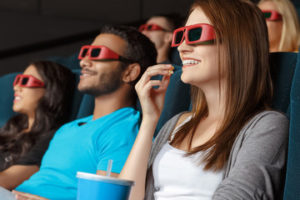Does 3D Send you Spinning? Let’s see Why!
 3D entertainment is nothing new. Many of us basked in the boldness of these special movies throughout childhood. The moment we donned that plastic, red and blue spectacles, we entered into a magical world in which nothing looked normal. That is until we looked at the mega-on screen in front of us. If you were like many children who put those glasses on, you probably didn’t want to take them off. They were evidence of your special break from reality! Alas, nothing in the real world can be observed through those glasses. And for many people, nothing on the screen can be, either.
3D entertainment is nothing new. Many of us basked in the boldness of these special movies throughout childhood. The moment we donned that plastic, red and blue spectacles, we entered into a magical world in which nothing looked normal. That is until we looked at the mega-on screen in front of us. If you were like many children who put those glasses on, you probably didn’t want to take them off. They were evidence of your special break from reality! Alas, nothing in the real world can be observed through those glasses. And for many people, nothing on the screen can be, either.
Not everyone loves or can tolerate, 3D movies and other entertainment. The interaction between what is on the screen and the natural eye doesn’t always play out the way it should, and one may become nauseous or dizzy. If this has happened to you, we can tell you why.
Altering the Natural
You are well aware that your eyes work naturally, and that when you alter their function, things get a little wonky. You can observe how the eyes work naturally is to look through only one eye at a time. When you look only through the left, you get one view. When you switch, the view changes; only slightly, but it changes. This is nature’s way of creating our optimal field of vision, and our ability to perceive dimension and depth. Those technically advanced 3D movies; they recreate this very function on the big screen.
How it’s Done
A 3D movie is filmed with these two separate lenses, always positioned a couple of inches apart. The result is an overlap of two perspectives on the big screen. Because your eyes naturally overlap what they observe in the natural world, they cannot perceive the 3D film without a little help. That’s where those lovely plastic glasses come in. They alter what we see by filtering color.
When 3D Goes Awry
So, if special spectacles are intended to help the eyes acclimate to the unnatural programming of the 3D movie, why do some people wind up feeling more motion sick and masterful during such flicks? It is simple, and it, fortunately, does not affect your day to day vision. The eyes work somewhat like binoculars, overlapping those two perspectives we discussed to create a clear image. Sometimes, the eyes and brain do not connect the dots as needed, and some of the information entering the eye is not observed by the brain.
How is your real-life vision? We are happy to schedule an eye exam for you in our Melrose or Reading office.



Leave a Reply
Want to join the discussion?Feel free to contribute!